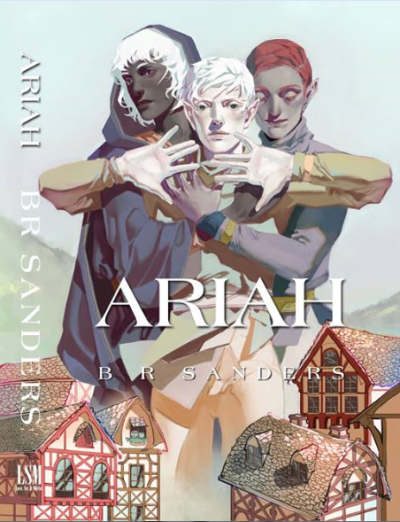Der mentsh trakht un Got lakht
Ariah
By B R Sanders

9 Mar, 2016
0 comments
I get to pick more of what I read these days than I did two years ago … but I don’t begrudge the time spent reading what other people select for me. From time to time they pick something interesting, something that would have otherwise flown under my radar. Case in point: B. R. Sanders’ 2015 novel Ariah.
Planning his life seemed so straightforward to young Ariah: apprentice himself to Dirva, master his skills as a mimic and empathic shaper, then find some conventional niche to fill for the rest of his life. But, just as moving from his backwater hometown Ardijan to the big city of Rabatha brings a rude awakening about the true place of elves in the Empire, so too will life with Dirva educate Ariah in ways he never expected.
The first and most obvious way Ariah’s life changes is that he is no longer part of a large community of elves surrounding a few ruling Qin. Instead, he is an elf lost in a sea of Qin, grudgingly tolerated as long he is useful, always distrusted, always subject to brutal punishment if he is deemed to have broken the law. And where elves are concerned, a determined official can always find a law the elf has broken.
Ariah’s unconsidered plan for himself really goes off the rails when he accompanies his teacher on a trip to visit Dirva’s family. For an empath like Ariah, the reunion is a challenging environment; Dirva has not seen in his family in twenty five years, and the occasion for the reunion is his father’s impending death.
In addition to that swirl of emotions, there’s also Ariah’s first realization that the conventions he has always accepted are not universal. Other places, other customs. And having experienced different ways, it will be impossible to squeeze back into the same tiny box he accepted as normal before his awakening.
~oOo~
I was a bit thrown by the author’s decision to use Qin as the name of the people running a vast, oppressive empire. This is because it was the Qin Dynasty that conquered the other warring states to form the nucleus of China. The name seems to be entirely coincidental.
I was also a little taken aback by elf society’s inept handling of magic, which, in this setting, is a normal part of every elf’s life. Then I pondered the vast range in eptitude humans have dealing with gender1, reproduction, and related matters, often failing to maximize satisfaction and well being for the greatest number of people. Looked at in that context, it seemed all too possible that elf society would not be a reliable, supportive community for shapers.
Elven society is also shaped by their subordinate position within Qin society. The Qin both exploit and despise elves and their gifts. Many of the elves, in particular Ariah, have absorbed Qin values without being particularly aware of it. I am not sure if the diligence with which elves police themselves is due to their being just one oppressed minority in a great empire, or if it’s just a normal hominid thing. Ariah isn’t in a position to do anything about Qin society (at one point he is even forced to support a Qin conquest), but he does learn to stop internalizing their values.
Ariah is both a member of a detested minority within a larger society, and an outlier within his own community. He is doubly vulnerable. But he is also an object lesson in accepting opportunities to redefine himself and his place in the world. He learns that while he might have expected a simple, straightforward family life, the more complicated life he embraces is, in the end, more satisfying.
Poking around to learn more about this novel, I’ve seen disparaging comparisons to Mercedes Lackey novels. Now, I think Sanders is a better and more interesting author than Lackey, but Lackey’s books would not be so popular if she were not filling a need. I enjoyed this Bildungsroman — but I am not really its target market. I suspect somewhere out there is a teenager who will absolutely adore it, a kid for whom this will turn out to be just the right book at just the right time. I just have no idea how to ensure they see this novel.
Ariah is available here.
1: Elf physiology seems to be a bit more inherently overtly fluid in gender expression than human, but not as fluid as, say, your average Gethenian in the street.Or rather, the range seen is smallerfor elves than Gethenians but the elf dial is continuous, rather than having presets.
